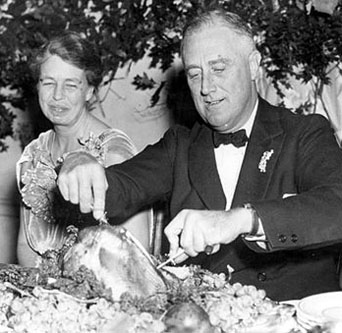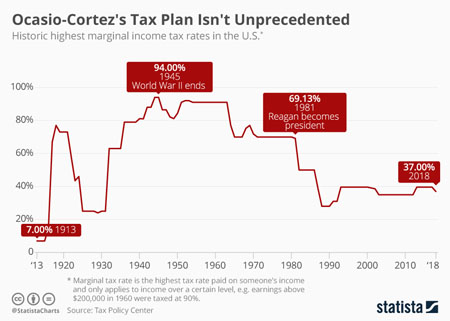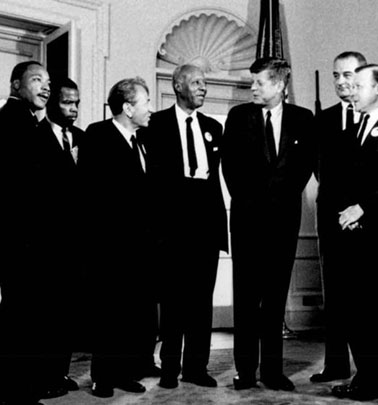Is AOC just trying to revive the progressive democratic legacies of FDR, JFK, and LBJ?
Feb 3rd, 2019 | By Citizen X | Category: USA Today
The almost sudden rise of Alexandria Ocasio-Cortez is one of the more intriguing things about American politics right now.
She has become an almost sparkling new standard bearer for variously labelled radical, progressive, or just left Democrats (and even some “Wall Street liberals”!), energized by the 2018 midterm elections and the ongoing foibles of the Trump Republicans – and their reckless “populist conservative” leader.
Ms Ocasio-Cortez is also known by her three initials AOC. (And if this reminds you of FDR and JFK, or even LBJ, that could be the intention.) In just a few words, she is the unquestionably charismatic new House of Representatives member for the eastern Bronx and north-central Queens in New York City (aka congressional district NY—14).
A few weeks ago a group of FOX News commentators were nervously discussing the prospect that Alexandria Ocasio-Cortez might even become the Democrats’ presidential nominee for 2020. They forgot that at 29 AOC is “the youngest woman ever to serve in the United States Congress” – and fails to meet the minimum age of 35 for presidents under the US Constitution.
This past January 15, 2019, eg, the radical Michigan film maker Michael Moore urged “that the Democrats follow the lead of Alexandria Ocasio-Cortez. She stands where the MAJORITY of Americans stand: Tax the rich, Medicare for All, a New Green Deal, stop ICE, end mass jailing, higher min wage, free college. NOW.”

Franklin Delano Roosevelt (FDR) carves Thanksgiving turkey as his especially progressive activist wife Eleanor looks on.
AOC’s policy ideas have also come in for much criticism. The first concept in the seven-point program summarized by Michael Moore has attracted the most attention.
According to the Daily Beast, eg : “Howard Schultz blames Alexandria Ocasio-Cortez for his decision to run as Independent and it has to do with her plan to tax the rich.”
Michael Dell (Dell computers etc) urged that a 70% tax rate on the highest annual incomes was absurd. Yet his “name a country where that’s worked, ever” was met by MIT professor Erik Brynjolfsson’s crisp reply : “The United States … from about the 1930s through about the 1960s.” (From FDR, that is, through JFK to LBJ.)
* * * *
 A January 25, 2019 piece from the statista website by Niall McCarthy – “Ocasio-Cortez’s Tax Plan Isn’t Unprecedented” – usefully spells out Professor Brynjolfsson’s point. (See the accompanying chart with the same name.)
A January 25, 2019 piece from the statista website by Niall McCarthy – “Ocasio-Cortez’s Tax Plan Isn’t Unprecedented” – usefully spells out Professor Brynjolfsson’s point. (See the accompanying chart with the same name.)
Niall McCarthy also notes that despite “its icy reception in Switzerland” recent polling from The Hill/HarrisX finds that in the USA “59 percent of the public favors a 70 percent marginal tax rate [on annual incomes above $10 million] with 45 percent of Republicans also behind it.”
McCarthy spells out the larger point in prose as well : “the highest marginal tax rate for the highest-earners near the end of the Second World War was 94 percent … and it was still as high as 91 percent in the early 60s. That all changed under Reagan when he slashed taxes, resulting in the marginal rate plummeting to 50 percent in 1982. Since 1987, it has remained low, never rising above 40 percent, according to data from the Tax Policy Center.”
Reaching still further back in time, in a January 24, 2019 article in New York magazine Eric Levitz argued that “AOC Thinks Billionaires Are a Threat to Democracy. So Did Our Founders.”
Levitz alluded among others to Thomas Jefferson, and to the French aristocrat Alexis de Tocqueville’s characterization of the 1830s (non-slave) Americans who “possessed ‘the charm of anticipated success’ – a ubiquitous optimism that he attributed to our country’s democratic character, and to the ‘general equality of condition’ that prevailed among its ‘people’.”
Those of us who grew up immediately after the Second World War, in the late 1940s, 1950s, and 1960s, can still remember how the world of FDR, JFK, and LBJ (and Harry Truman and General Dwight Eisenhower) was in some ways more progressive and democratic than what followed the right-wing revolutions of the 1970s and 1980s – which have led us to where we are today.
It is at the very least interesting to see a 29-year old woman trying to revive something of this earlier American progressive legacy for the 21st century. At the same time, it is of course all too easy to be sceptical about all such things, in a world still so profoundly influenced by the narrow self-interests of Davos billionaires.
But consider this recent Abacus Data finding on the rising younger generation in Canada : “Millennials are looking for a parental government – a government that will take care of them if they get in trouble, and ensure the best outcome for everyone. From personal finances to policing, national defence, the environment, and social services, millennials want to feel that the government is a social justice advocate.”
Something similar is no doubt afoot in the USA today as well. And Alexandria Ocasio-Cortez is speaking right into its deepest heart. Which may finally somehow prove more relevant than Howard Schultz and Michael Dell and all their colleagues can easily understand. Meanwhile, AOC is at least making American politics more democratic (and Democratic) – and more entertaining too!




